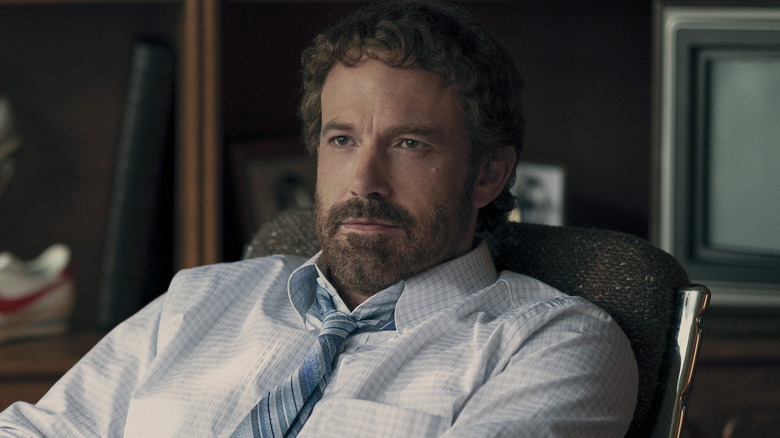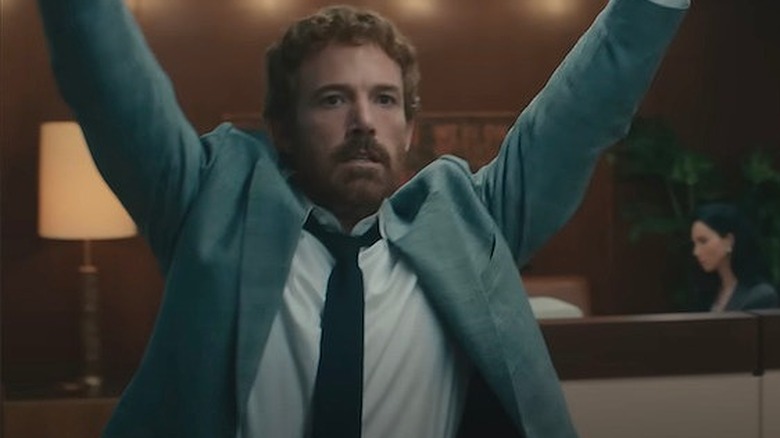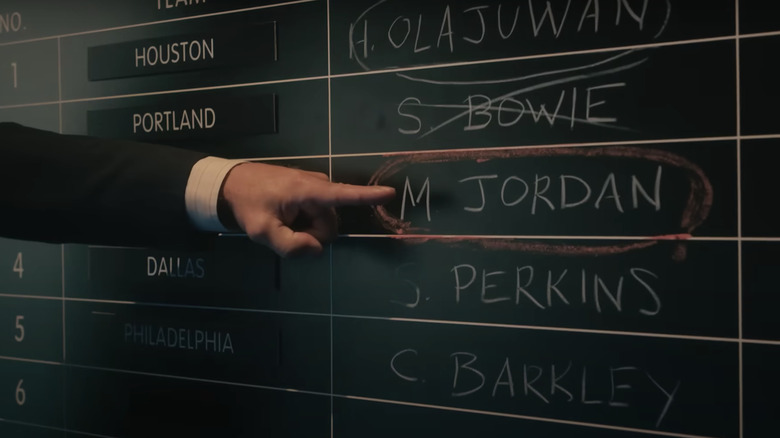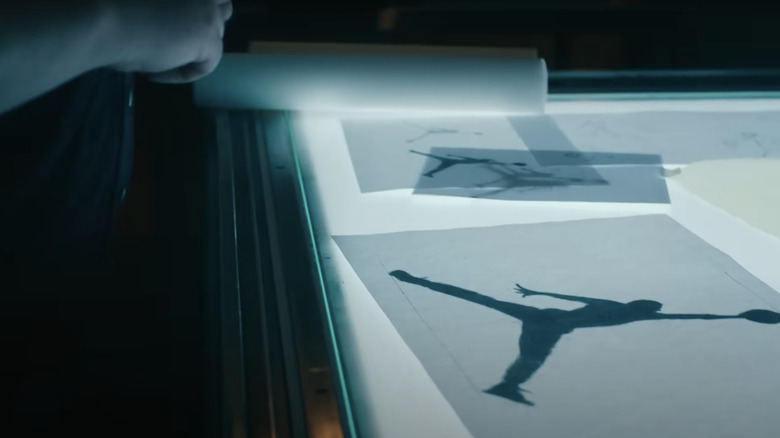Is Air Really A Better Movie Without Michael Jordan?
Amazon Studios' "Air," a sports drama about the landmark Nike shoe deal with Michael Jordan, is notable for the fact that it never shows Jordan's face nor gives his actor (Damian Young) a single line of dialogue. But why was this the case?
"Michael's just too famous," director Ben Affleck almost excitedly admitted to Yahoo! Entertainment. "[He's] too meaningful and too important and too much of an icon for me to believe ... that any actor could convince you that they, in fact, were Michael Jordan... his silhouette is recognizable around the world."
It's hard to acknowledge Affleck's fears as anything but a sound artistic calculation — one that may have saved his film "Air" from falling before it even left the ground. Rather than risk months of ridicule from armchair casting agents and die-hard sports fans around the world, Affleck turned his focus entirely to the no less fascinating subjects that made Jordan's game-changing brand deal with Nike possible. Affleck himself plays Nike co-founder and former CEO Phil Knight, while Jason Bateman, Chris Tucker, and Matthew Maher take on the roles of high-level employees roped into a risky deal. At the center of this scheme is Matt Damon's Sonny Vaccaro, the marketing exec who recognized Jordan as the future of Nike and the NBA.
Throughout the film, Damon's Sonny is characterized by his unshakable belief that Jordan is destined for greatness, something no one else shared at the time, according to the film. As it does for Vaccaro and Nike, the script of "Air" paints Michael Jordan as an underdog. In a story that seeks to explore the importance of believing in ourselves and each other, this dynamic works perfectly — that is, when it's not being undercut by direction that turns Jordan into a ready-made legend.
The script doesn't support the choices made by Ben Affleck
As valid as Ben Affleck's anxieties about casting Michael Jordan are, his reverence for the athlete only works to confuse the point of "Air" entirely.
The script is clear in its characterization of Jordan without affording him a single line. His mother, Deloris (Viola Davis) speaks of him like a parent protecting their young child; his agent, David Falk (Chris Messina), laughs at Jordan's wishes for a sports car as the demands of a typical teenager; and Phil Knight recoils at the idea of spending their entire marketing budget on a college student. Whenever anyone but Sonny talks about Michael, they talk about him like a kid — and even Sonny himself marvels that University of North Carolina coach Dean Smith would trust a freshman to land the game-winning shot against Georgetown in 1982. And yet, even as the script works to ground Jordan's godlike persona, the camera tricks and framing tell the audience he's a god.
When shoe designer Peter Moore (Matthew Maher) asks who Nike's new shoe is meant for, the camera pushes in on Damon as he takes a dramatic breath ... then, as the music swells, he says, "Michael Jordan." The moment doesn't feel loaded with such operatic importance because it's the first time we hear his name (it's not) or even because this is a defining moment in the story, but because the director believes the very mention of his name deserves cinematic impact. Several similar moments occur throughout the film, though none are as distracting as Jordan looming over each scene he's in like an awe-inspiring specter.
In Air, Michael Jordan is a name and a logo -- not a person
Perhaps unintentionally, this choice only mystifies Michael Jordan as a being that can only exist in our collective imaginations, rather than the young underdog the story should want us to believe in as much as Sonny Vaccaro did. As Sonny delivers an impassioned speech to the Jordan family during the Nike pitch, he warns that same college kid that the world will reductively build him up into something unattainable only to tear him down for not achieving it — for not being the legend we all imagine he is. And yet, while Matt Damon (as Sonny) says this, Michael watches as a revered shadow — the legendary silhouette that Jordan is reduced to every time the company makes a new shoe.
It's understandable why Affleck didn't want to focus on Jordan, lest he turn "Air" into, as he called it, "the Michael Jordan Story." It would be a far less interesting film, one only doomed to disappoint. But if the film wants us to believe that Michael Jordan is a human being like everyone else, whose career was defined not just by his talent, but by surrounding himself with people who truly believed in him, the film needed to bring him down to the same level as everyone else.
It wouldn't even have been necessary for him to have a single line. He could have continued to sit silently in the meetings, and audiences could have looked into the eyes of a young man too bored, overwhelmed, youthfully arrogant, or scared to speak. They could have seen Michael as a person, and — more importantly — been given the chance to believe in him too.
Everybody knew ...
In an interview with The Hollywood Reporter, Ben Affleck described Michael Jordan as a hero to the sporting world, to the Black community, and — most importantly — to the director himself. Before starting production, Affleck met with Jordan to personally ask for his blessing. When Jordan requested that his friend Howard White (Chris Tucker) be included and that Viola Davis play his mother, Affleck radically changed the story to do so – Deloris had just one line before Davis' name was mentioned by Jordan. To be clear, the film is unquestionably better because of Davis' involvement and the inclusion of White, an instrumental yet overlooked figure in Jordan's time with Nike. It's even arguably to the film's benefit that Affleck is so clearly inspired by and in awe of Jordan himself — for all the movie's faults, that passion bursts through the screen in ways that can't help but make the audience want to cheer.
Yet, even as "Air" ultimately succeeds as an uplifting and engaging tale, one will likely leave the theater feeling insidiously distant from Jordan. As characters somberly note that almost everyone involved in the Air Jordan pitch will be forgotten by history, it feels as though Michael Jordan will be too. Not the icon, the brand, or the legendary basketball star who made the game he loved a national sensation, but the boy from Wilmington, North Carolina, who navigated and survived a ruthless business because he believed in those who believed in him.
We already believed in the silhouette. We wanted to believe in Michael Jordan.



